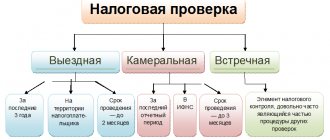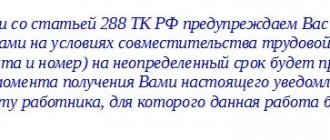Article 94 of the Tax Code of the Russian Federation. Seizure of documents and objects (current edition)
The commented article is devoted to the seizure of documents and items during a tax audit.
Seizure of documents and items is carried out only as part of an on-site tax audit, as well as in the event that the organization refused to submit these documents at the previously presented request of the tax authority.
The Federal Antimonopoly Service of the Central District, in Resolution No. A36-2365/2008 of March 30, 2009, recognized as unfounded the taxpayer’s arguments about the absence of grounds for seizure, that seizure of documents can only be carried out during an on-site tax audit
Confiscation of documents and items from a taxpayer should not be carried out without reason, but should be carried out if the tax authority has evidence indicating that these documents can be destroyed, hidden, altered or replaced.
In cases where there are not enough copies of documents and the tax authority has reasonable grounds to believe that the original documents may be destroyed, hidden, corrected or replaced, the original documents may be confiscated from the taxpayer.
The Determination of the Supreme Arbitration Court of the Russian Federation dated July 27, 2012 N VAS-9105/12 indicates the legality of the position of lower courts. The tax authority adopted a resolution on the seizure of documents during an on-site tax audit of the taxpayer in order to conduct a handwriting examination of documents relating to his financial and economic activities in relations with counterparties, in which he indicated the reasons for their possible destruction, concealment, correction, change or replacement.
Refusing the taxpayer's request to invalidate this resolution, the lower courts came to the conclusion that the tax authority had sufficient grounds for seizing documents; accordingly, the provisions of Articles 31, 89 and 94 of the Tax Code of the Russian Federation were not violated by the tax authority. The court agreed with the tax authority's argument about the possibility of destruction, concealment, and correction of original documents by the taxpayer. The court did not establish any facts of abuse by tax authority officials of their rights when carrying out seizures, as well as violations of the rights and legitimate interests of the taxpayer in the field of entrepreneurial and other economic activities. The seizure of documents and items was carried out in the presence of witnesses and representatives of the company, copies of the seized documents were handed over to the taxpayer according to the inventory, the company did not submit any comments to the protocol, a copy of the protocol was handed over.
The conclusions of the lower courts regarding the application of the mentioned provisions of the Tax Code of the Russian Federation, as noted by the Supreme Arbitration Court of the Russian Federation, do not contradict the legal approaches set out in the Resolution of the Presidium of the Supreme Arbitration Court of the Russian Federation dated April 26, 2011 N 18120/10.
The Presidium of the Supreme Arbitration Court of the Russian Federation considered a situation in which, during the examination of the submitted documents at the organization’s office, a tax official suggested that the signatures of the heads of counterparties on the documents did not visually match, therefore a handwriting examination of the original documents was required. For this reason, the tax authority needed to adopt a resolution on the seizure of documents, which refers to Article 94 of the Tax Code of the Russian Federation and indicates the need to carry out the said examination as a motive.
The case materials do not contain evidence of a threat of destruction, concealment, correction or replacement of original documents by the company. The decision to seize documents also does not provide reasons for their possible destruction, concealment, correction, modification or replacement.
At the same time, the case materials confirm the need to conduct a handwriting examination in view of the inspector’s assumption that business transactions with the relevant counterparties were fictitious.
Since, according to paragraph 8 of Article 94 of the Tax Code of the Russian Federation, one of the cases allowing for the seizure of documents is the insufficient availability of copies of documents at the disposal of the tax authority, the Presidium of the Supreme Arbitration Court of the Russian Federation indicated the legality of refusing to invalidate the resolution on seizure of documents.
In Resolution No. A32-7729/2011 dated January 15, 2013, the Federal Antimonopoly Service of the North Caucasus District established that the only document that records the list of documents seized from the organization is the seizure act. The specified document is not procedural, the form and mandatory preparation of which are provided for in Article 99 and paragraph 6 of Article 94 of the Tax Code of the Russian Federation.
At the same time, the court accepted the seizure act as admissible evidence in the case, since in this case, the impossibility of identifying in the manner established by tax legislation the documents seized from the organization during a tax audit was caused by the tax authority’s violation of the requirements established by Article 94 of the Tax Code of the Russian Federation.
The court indicated that a violation of the procedure for seizure of documents committed by the tax authority should not entail negative consequences for the taxpayer in the form of loss of seized documents and the inability to exercise their right to judicial protection.
The presence of a large number of documents does not relieve the tax authority from the obligation to list and describe in the seizure protocol or in the inventories attached to it the seized documents with an exact indication of their names in accordance with Article 94 of the Tax Code of the Russian Federation.
The FAS Moscow District, in Resolution No. A40-37984/12-107-191 dated January 17, 2013, came to the conclusion that the provisions of Articles 89 and 94 of the Tax Code of the Russian Federation provide for only two possible grounds for the seizure of documents and items during an on-site tax audit: insufficient copies documents submitted by the taxpayer, including due to the need to conduct an examination, which requires original documents, and the presence of confirmed grounds that the taxpayer’s original documents may be destroyed, hidden, corrected or replaced.
The Tax Code of the Russian Federation does not provide any other grounds for seizure.
The Tax Code of the Russian Federation provides for the obligation of the tax authority to return original documents only in a situation where, when they were withdrawn, the tax authority did not make and transfer copies of them to the taxpayer.
Consequently, it is unlawful to withhold original documents in cases where the tax authority has not provided the taxpayer with the appropriate copies.
This position is confirmed by judicial practice (see Resolutions of the Federal Antimonopoly Service of the North Caucasus District dated 02/06/2007 N F08-173/2007-83A, dated 01/26/2010 N A32-8547/2008-12/69).
Comment source:
“ARTICLE-BY-ARTICLE COMMENTARY TO PART ONE OF THE TAX CODE OF THE RUSSIAN FEDERATION” (UPDATE)
Yu.M. Lermontov, 2016
Article 94 (Tax Code of the Russian Federation) of the Tax Code of the Russian Federation. Removal of documents and objects
1. Seizure of documents and items is carried out on the basis of a reasoned resolution of an official of the tax authority carrying out an on-site tax audit.
This resolution is subject to approval by the head (his deputy) of the tax authority that made the decision to conduct a tax audit.
(as amended by Federal Law dated November 16, 2011 N 321-FZ)
2. Confiscation of documents and objects at night is not allowed.
3. Seizure of documents and objects is carried out in the presence of witnesses and persons from whom the documents and objects are seized. If necessary, a specialist is invited to participate in the excavation.
Before the seizure begins, the tax official presents a resolution on the seizure and explains to those present their rights and obligations.
4. A tax official invites the person from whom documents and items are being seized to voluntarily hand them over, and in case of refusal, he makes the seizure forcibly.
If the person from whom the seizure is being made refuses to open the premises or other places where documents and objects subject to seizure may be located, the tax official has the right to do this independently, avoiding causing unnecessary damage to locks, doors and other objects.
5. Documents and items that are not related to the subject of the tax audit are not subject to seizure.
6. A protocol on the seizure, seizure of documents and objects is drawn up in compliance with the requirements provided for in Article 99 of this Code and this article.
7. Seized documents and items are listed and described in the seizure protocol or in the inventories attached to it, with a precise indication of the name, quantity and individual characteristics of the items, and, if possible, the value of the items.
8. In cases where there are not enough copies of the documents of the person being inspected to carry out tax control activities and the tax authorities have sufficient grounds to believe that the original documents may be destroyed, hidden, corrected or replaced, the tax authority official has the right to seize the original documents in the manner prescribed this article.
(as amended by Federal Law dated July 27, 2006 N 137-FZ)
When such documents are confiscated, copies are made of them, which are certified by a tax official and handed over to the person from whom they are confiscated. If it is impossible to make or transfer the copies made simultaneously with the seizure of the documents, the tax authority transfers them to the person from whom the documents were seized within five days after the seizure.
9. All seized documents and objects are presented to witnesses and other persons involved in the seizure, and, if necessary, are packed at the site of seizure.
Seized documents must be numbered, laced and sealed or signed by the taxpayer (tax agent, fee payer, insurance premium payer). If the taxpayer (tax agent, fee payer, insurance premium payer) refuses to affix a seal or signature to the seized documents, a special note is made about this in the seizure protocol.
(paragraph introduced by Federal Law dated July 27, 2006 N 137-FZ; as amended by Federal Law dated July 3, 2016 N 243-FZ)
10. A copy of the protocol on the seizure of documents and objects is handed over against receipt or sent to the person from whom these documents and objects were seized.
Previous article | Tax Code of the Russian Federation part 1 | Next article
Tax Code of the Russian Federation Article 94 Seizure of documents and objects
1. Seizure of documents and items is carried out on the basis of a reasoned resolution of an official of the tax authority carrying out an on-site tax audit.
This resolution is subject to approval by the head (his deputy) of the tax authority that made the decision to conduct a tax audit.
2. Confiscation of documents and objects at night is not allowed.
3. Seizure of documents and objects is carried out in the presence of witnesses and persons from whom the documents and objects are seized. If necessary, a specialist is invited to participate in the excavation.
Before the seizure begins, the tax official presents a resolution on the seizure and explains to those present their rights and obligations.
4. A tax official invites the person from whom documents and items are being seized to voluntarily hand them over, and in case of refusal, he makes the seizure forcibly.
If the person from whom the seizure is being made refuses to open the premises or other places where documents and objects subject to seizure may be located, the tax official has the right to do this independently, avoiding causing unnecessary damage to locks, doors and other objects.
5. Documents and items that are not related to the subject of the tax audit are not subject to seizure.
6. A protocol on the seizure, seizure of documents and objects is drawn up in compliance with the requirements provided for in Article 99 of this Code and this article.
7. Seized documents and items are listed and described in the seizure protocol or in the inventories attached to it, with a precise indication of the name, quantity and individual characteristics of the items, and, if possible, the value of the items.
8. In cases where there are not enough copies of the documents of the person being inspected to carry out tax control activities and the tax authorities have sufficient grounds to believe that the original documents may be destroyed, hidden, corrected or replaced, the tax authority official has the right to seize the original documents in the manner prescribed this article.
When such documents are confiscated, copies are made of them, which are certified by a tax official and handed over to the person from whom they are confiscated. If it is impossible to make or transfer the copies made simultaneously with the seizure of the documents, the tax authority transfers them to the person from whom the documents were seized within five days after the seizure.
9. All seized documents and objects are presented to witnesses and other persons involved in the seizure, and, if necessary, are packed at the site of seizure.
Seized documents must be numbered, laced and sealed or signed by the taxpayer (tax agent, fee payer). If the taxpayer (tax agent, fee payer) refuses to affix a seal or signature to the seized documents, a special note is made about this in the seizure protocol.
10. A copy of the protocol on the seizure of documents and objects is handed over against receipt or sent to the person from whom these documents and objects were seized.


